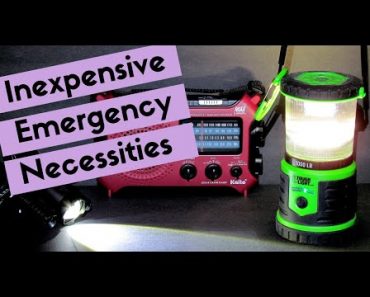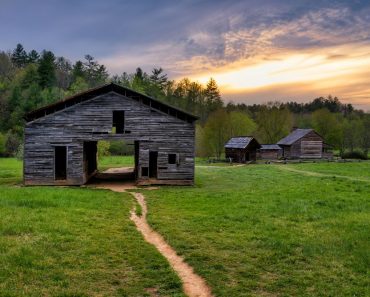The worst has happened, and the world as we know it has come to an end. You’re not worried, though — you’ve got a fully stocked survival shelter with everything you could need or want to help you survive. You’ve honed your skills, hardened your body, and learned what it will take to keep you and your family alive, no matter what SHTF scenario is playing out outside your doors.
Once the dust settles, if things don’t go back to normal, we’ll have to spend some time figuring out how to manage our health and wellness. Going to the gym and shopping at your favorite grocery store likely won’t be an option. Here’s how to maintain a healthy lifestyle while living in a survival shelter.
Facet One: Exercise
When people think of living a healthy lifestyle, the first thing that usually comes to mind is exercise. That is one facet of maintaining a healthy lifestyle, but it doesn’t make up all the puzzle pieces. Still, if you can’t take your regular trip to the gym, what can you do to stay healthy and maintain your workout regimen?
Stock up on Equipment
If you’re concerned about being able to maintain your fitness while gathering survival supplies and food, consider investing in some workout essentials as well. You don’t need to break the bank by buying the fanciest types of equipment. A few plates or dumbbells can make a world of difference.
This isn’t an exhaustive list, but consider adding these things to your survival supply collection if you’re looking for a place to start.
● A yoga mat or two for bodyweight exercises or yoga
● A doorway pullup bar for upper-body exercises
● A TRX Suspension Trainer or something similar
● Resistance bands
● Dumbbells, kettlebells, or plates
● A punching bag
The goal is to make the most out of your equipment while using as little space as possible.
Use Your Environment
You might not be able to take a trip to the gym, but that doesn’t mean you can’t work out. There are all sorts of things in the world around you that you could use for exercise or strength training. Bodyweight exercises don’t require any equipment and are something you can do nearly anywhere.
Going out for a run or a swim can work as a cardio exercise if it’s safe to do so. Splitting logs with an ax or maul ensures you have enough wood to cook food or keep your home warm while improving the strength of your arms, shoulders, and upper body.
You can use many things as exercise tools that you might not otherwise think of. You can curl jugs of water or other liquids — 1 gallon of water weighs 8.3 pounds — or do a weighted squat with a log across your shoulders. Use your imagination.
Try High-Intensity Interval Training (HIIT)
We’re used to two basic forms of exercise — strength training and cardio — but this isn’t the only way to work out. High-intensity interval training, or HIIT, is a unique type of cardio training that has become a popular option for athletes working on improving their endurance, burning fat, and gaining strength. It can even help improve your body’s glucose metabolism, which refers to how it burns energy as you exercise or move throughout the day.
As its name suggests, HIIT uses intervals to maximize the benefits you can get from your exercise. After you warm up, do an activity at your maximum intensity for 20-30 seconds, then take a short rest before jumping into the next move. The goal is to keep your heart rate high enough to burn fat throughout your workout.
Facet Two: Diet
Exercise isn’t the only thing you need to worry about when thinking about living a healthy lifestyle. Eating a balanced diet also plays a major role in overall health. This might seem impossible if you can’t make your regular weekly trip to the grocery store, but there are ways you can stay healthy even if the world turns upside down.
Eat a Varied Diet
It’s tempting to eat the same thing every day when living through the world’s end. Why bother eating something fancy if everything around you is burning?
Instead of living through this fatalistic mindset, work on eating a varied diet. Make sure you include complex carbohydrates, lean proteins, and fruits and vegetables as often as possible. These can all be canned, dried, or freeze-dried, depending on what you have in your survival stash. It isn’t as good as eating fresh, but preserved foods still contain high levels of the nutrients you need to maintain a healthy diet.
Grow Your Own Produce
If the world is ending in a way that means it can’t or won’t go back to normal, growing your own produce will become necessary. Learn to read the seasons in your region and work on creating a successful garden. This might take some practice. You may even wish to include a garden as part of your survival prep, so you don’t have to worry about starting your plants from scratch amid the chaos.
Eat Mindfully
Eating mindfully means that when you sit down to consume your meal, that is all you’re doing. In the modern world, we tend to do other tasks while we eat — from watching TV to working to checking emails. This can keep our mind occupied, but it disconnects us from the act of eating. In addition to making it more difficult to be mindful, it becomes easier to miss your body’s fullness cues, leading to overeating.
Whenever the opportunity arises, take the time to eat mindfully. This won’t always be an option, especially if you’re shoveling protein bars into your face while running for your life. Still, it’s a good idea to slow down and eat a sit-down meal.
Stay Hydrated
This should be common sense, but it is so important that it bears repeating. Be careful to stay hydrated, especially in a survival situation. Drink plenty of water when you feel thirsty — and drink more if you’re exercising or exerting yourself. The warmer it is outside, or the more you’re moving around, the more water you’ll need to drink each day. Coffee, tea, and other flavored drinks don’t work nearly as well, so make sure you drink plenty of water.
Facet Three: Mental Health
Physical health isn’t the only thing to be concerned about if the world ends. You’ll need to consider one final facet — your mental health. This is especially vital if your world has been turned upside down and your focus is on survival.
Feel Your Feelings
It’s often too easy to bottle all your feelings up and stash them in the deepest or darkest corners of your mind. It can help you survive in an emergency, enabling you to stay calm when things are going pear-shaped. Afterward, though, you need to take the time to feel and process those emotions. Otherwise, if you bottle everything up, all it takes is one good shake, and you’ll explode.
Take the time to feel and analyze each emotion individually. Don’t judge yourself for having them. Emotions are a natural part of being human, especially in stressful situations. Instead, experience them and let them pass through you, so they don’t negatively affect your day-to-day life. Mental health is just as important in the apocalypse as it is when things are normal.
Choose Your Coping Strategies Well
There are several coping strategies you can choose from when dealing with your mental health in the apocalypse. Some of them are less healthy than others, so choose them carefully. Don’t rely on harmful behaviors like substance abuse. They aren’t sustainable in the long run, and if you get yourself into trouble, there isn’t anyone you can call to help you.
Check-in With Yourself
Take the time to check in with yourself regularly, especially if you’re alone in your survival shelter. How are you feeling, how are you coping, and what do you need to address to ensure you can maintain your mental health while surviving? Meditation can be a great tool for this sort of check-in. However, if you can’t slow down enough to find time to meditate, make sure you’re taking the time to ensure you’re doing OK. Remember that no one expects you to be coping perfectly with the end of the world.
Maintaining a Healthy Lifestyle in the Apocalypse
We’re used to having access to good food and gym memberships to help us stay healthy, but that will all go away if the world ends. Keep these tips in mind if you’re concerned about your ability to maintain a healthy lifestyle while surviving an apocalypse. It’s not just about lifting weights and running marathons. Make sure you’re thinking about your food intake and mental health, as well.
Take care of yourself, even if the world is falling apart around you. You’ve got plenty of tools and skills in your arsenal, as long as you’re willing to take the time to employ them.
>>> GET THIS BOOK TO DISCOVER MORE <<<




























